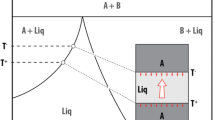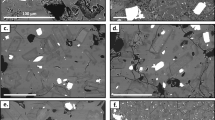Abstract
We carried out an experimental study to characterize the kinetics of Ostwald ripening in the forsterite-basalt system and in the plagioclase (An65)-andesite system. Eight experiments were done in each system to monitor the evolution of mean grain size and crystal size distribution (CSD) with time t; the experiments were performed in a 1-atmosphere quench furnace, at 1,250°C for plagioclase and 1,300°C for olivine. Very contrasted coarsening kinetics were observed in the two series. In the plagioclase series, the mean grain size increased as log(t), from ≈3 μm to only 8.7 μm in 336 h. The kinetic law in log(t) means that Ostwald ripening was rate-limited by surface nucleation at plagioclase-liquid interfaces. In the olivine series, the mean grain size increased as t 1/3, from ≈3 μm to 23.2 μm in 496 h. A kinetic law in t 1/3 is expected when Ostwald ripening is rate-limited either by diffusion in the liquid or by grain growth/dissolution controlled by a screw dislocation mechanism. The shape of olivine CSDs, in particular their positive skewness, indicates that grain coarsening in the olivine experiments was controlled by a screw dislocation mechanism, not by diffusion. As the degrees of undercooling ΔT (or supersaturation) involved in Ostwald ripening are essentially <1°C, the mechanisms of crystal growth identified in our experiments are expected to be those prevailing during the slow crystallisation of large magma chambers. We extrapolated our experimental data to geological time scales to estimate the effect of Ostwald ripening on the size of crystals in magmas. In the case of plagioclase, Ostwald ripening is only efficient for mean grain sizes of a few microns to 20 μm, even for a time scale of 105 years. It can, however, result in a significant decrease of the number of small crystals per unit volume, and contribute to the development of convex upwards CSDs. For olivine, the mean grain size increases from 2–3 μm to ≈70 μm in 1 year and 700 μm in 103 years; a mean grain size of 3 mm is reached in 105 years. Accordingly, the rate of grain size-dependent processes, such as compaction of olivine-rich cumulates or melt extraction from partially molten peridotites, may significantly be enhanced by textural coarsening.










Similar content being viewed by others
References
Ardell AJ (1972) The effect of volume fraction on particle coarsening: theoretical considerations. Acta Metall 20:61–71
Baronnet A (1984) Growth kinetics of the silicates. Fortschr Mineral 62:187–232
Bindeman IN (2003) Crystal sizes in evolving silicic magma chambers. Geology 31:367–370
Brailsford AD, Wynblatt P (1979) The dependence of Ostwald ripening kinetics on particle volume fraction. Acta Metall 27:489–497
Brandeis G, Jaupart C, Allègre CJ (1984) Nucleation, crystal growth, and the thermal regime of cooling magmas. J Geophys Res 89:10161–10177
Bulau JR, Waff HS, Tyburczy JA (1979) Mechanical and thermodynamical constraints on fluid distribution in partial melts. J Geophys Res 84:6102–6108
Cabane H (2002) Etude théorique et expérimentale de la cinétique du mûrissement d’Ostwald dans les magmas; implications pour la dynamique des processus magmatiques. PhD Thesis, Université Blaise Pascal
Cabane H, Laporte D, Provost A (2001) Experimental investigation of the kinetics of Ostwald ripening of quartz in silicic melts. Contrib Mineral Petrol 142:361–373
Chai BHT (1974) Mass transfer of calcite during hydrothermal recrystallization. Carnegie Inst Washington Pub 634, Geochemical transport and kinetics, pp 205–218
Dehoff RT (1984) Generalized microstructural evolution by interface controlled coarsening. Acta Metall Mater 32:43–47
Dehoff RT (1991) A geometrically general theory of diffusion controlled coarsening. Acta Metall Mater 39:2349–2360
Dowty E (1980) Crystal growth and nucleation theory and the numerical simulation of igneous crystallization. In: Hargraves RB (ed) Physics of magmatic processes. Princeton University Press, Princeton, pp 419–485
Gilmer GH (1976) Growth on imperfect crystal faces: I. Monte-Carlo growth rates. Jour Crystal Growth 36:15–28
Green JR, Margerison D (1978) Statistical treatment of experimental data. Elsevier, Amsterdam, p 382
Higgins MD (1994) Determination of crystal morphology and size from bulk measurements on thin sections: numerical modelling. Amer Mineral 79:113–119
Higgins MD (1998) Origin of anorthosite by textural coarsening: quantitative measurements of a natural sequence of textural development. J Petrol 39:1307–1323
Higgins MD (2000) Measurement of crystal size distributions. Amer Mineral 85:1105–1116
Hort M, Spohn T (1991) Crystallization calculations for a binary melt cooling at constant rates of heat removal: implications for the crystallization of magma bodies. Earth Planet Sci Lett 107:463–474
Jackson K, Uhlmann D, Hunt J (1967) On the nature of crystal growth from the melt. J Cryst Growth 1:1–36
Jambon A, Lussiez P, Clocchiatti R, Weisz J, Hernandez J (1992) Olivine growth rates in a tholeiitic basalt: an experimental study of melt inclusions in plagioclase. Chem Geol 96:277–287
Kahlweit M (1975) Ostwald ripening of precipitates. Adv Colloid Interface Sci 5:1–35
Kirkpatrick RJ (1975) Crystal growth from the melt: a review. Amer Mineral 60:798–814
Kirkpatrick RJ (1981) Kinetics of crystallization of igneous rocks. Mineral Soc Am Rev Mineral 8:321–398
Kirkpatrick RJ, Robinson GR, Hayes JF (1976) Kinetics of crystal growth from silicate melts: anorthite and diopside. J Geophys Res 81:5715–5720
Lasaga AC (1998) Reaction kinetics in geosciences. Princeton University Press, Princeton, p 811
LaTourette T, Wasserburg GJ, Fahey AJ (1996) Self diffusion of Mg, Ca, Ba, Nd, Yb, Ti, Zr, and U in haplobasaltic melt. Geochim Cosmochim Acta 60:1329–1340
Lesher CE, Hervig RL, Tinker D (1996) Self diffusion of network formers (silicon and oxygen) in naturally occuring basaltic liquid. Geochim Cosmochim Acta 60:405–413
Lifshitz IM, Slyozov VV (1961) The kinetics of precipitation from supersaturated solid solutions. J Phys Chem Solids 19:35–50
Marqusee JA, Ross J (1984) Theory of Ostwald ripening: competitive growth and its dependence on volume fraction. J Chem Phys 80:536–543
Marsh BD (1988) Crystal size distribution (CSD) in rocks and the kinetics and dynamics of crystallization: I. Theory. Contrib Mineral Petrol 99:277–291
Marsh BD (1998) On the interpretation of crystal size distributions in magmatic systems. J Petrol 39:553–599
Muncill GE, Lasaga AC (1987) Crystal-growth kinetics of plagioclase in igneous systems: one-atmosphere experiments and application of a simplified growth model. Amer Mineral 72:299–311
Ostwald W (1901) Uber die vemeintliche Isomerie des roten und gelben Quecksilberoxyds und die Oberflachen-spannung Fester Korper. Z Phys Chem 34:495–512
Park Y, Hanson B (1999) Experimental investigation of Ostwald-ripening rates of forsterite in the haplobasaltic system. J Volcanol Geotherm Res 90:103–113
Presnall DC, Dixon SA, Dixon JR, O’Donnel TH, Brenner NL, Schrock RL, Dycus DW (1978) Liquidus phase relations on the join diopside-forsterite-anorthite from 1 atm to 20 kbars: their bearing on the generation and crystallization of basaltic magma. Contrib Mineral Petrol 66:203–220
Ratke L, Uffelmann D, Bender W, Voorhes PW (1995) Theory of Ostwald ripening due to a second-order reaction. Scripta Metall Mater 33:363–367
Russ JC, Dehoff RT (2000) Practical stereology, 2nd edn. Kluwer/Plenum, Dordrecht, New York, p 381
Saltykov SA (1967) The determination of the size distribution of particles in an opaque material from the measurement of the size distribution of their sections. In: Helias H (ed) Stereology, Springer, Berlin Heidelberg New York, pp 163–173
Solomatov VS, Stevenson DJ (1993) Kinetics of crystal growth in a terrestrial magma ocean. J Geophys Res 98:5407–5418
Wagner C (1961) Theorie der Alterung von Niederschlägen durch Umlösen. Z Elektrochem 65:581–591
Walker D, Jurewicz SR, Watson EB (1988) Adcumulus dunite growth in a laboratory thermal gradient. Contrib Mineral Petrol 99:306–319
Watanabe K, Kitamura M (1992) Growth mechanisms of plagioclase in a basaltic melt. Mineral J 16:201–214
Weill DF, Hon R, Navrotsky A (1980) The igneous system CaMgSi2O6-CaAl2Si2O8-NaAlSi3O8: variations on a classic theme by Bowen. In: Hargraves RB (ed) Physics of magmatic processes. Princeton University Press, Princeton, pp 49–92
Worster MG, Huppert HE, Sparks RSJ (1990) Convection and crystallization in magma cooled from above. Earth Planet Sci Lett 101:78–89
Zhang Y, Walker D, Lesher CE (1989) Diffusive crystal dissolution. Contrib Mineral Petrol 102:492–513
Acknowledgements
This manuscript benefited from discussions with Alain Baronnet, Yves Bienvenu, Albert Jambon, Gilles Quérel, and Daniel Vielzeuf. Michèle Veschambre and Jean-Luc Devidal are thanked for technical assistance with the electron microprobe, and Pierre Boivin for technical assistance with the 1-atm furnaces. Ilya Bindeman is thanked for its constructive review and Dave Walker for raising the issue of thermal fluctuations in 1-atm furnaces. The authors acknowledge the financial support provided by the Institut National des Sciences de l’Univers (INSU-CNRS). Work supported in part by the European Community’s Human Potential Program under contract HPRN-CT-2002-00211 (Research Training Network EUROMELT). Contribution INSU-CNRS 381.
Author information
Authors and Affiliations
Corresponding author
Additional information
Communicated by Timothy L. Grove
Rights and permissions
About this article
Cite this article
Cabane, H., Laporte, D. & Provost, A. An experimental study of Ostwald ripening of olivine and plagioclase in silicate melts: implications for the growth and size of crystals in magmas. Contrib Mineral Petrol 150, 37–53 (2005). https://doi.org/10.1007/s00410-005-0002-2
Received:
Accepted:
Published:
Issue Date:
DOI: https://doi.org/10.1007/s00410-005-0002-2




